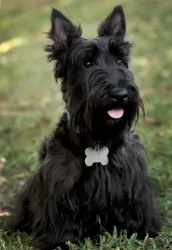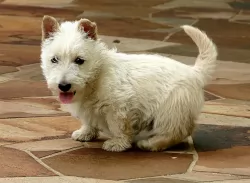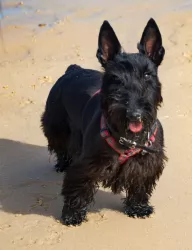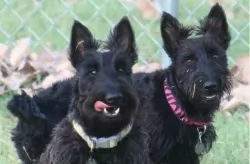 MyDogBreeds
MyDogBreeds Scoland Terrier is originated from United Kingdom but Dutch Shepherd is originated from Netherlands. Scoland Terrier may grow 35 cm / 13 inches shorter than Dutch Shepherd. Scoland Terrier may weigh 22 kg / 48 pounds lesser than Dutch Shepherd. Both Scoland Terrier and Dutch Shepherd has almost same life span. Both Scoland Terrier and Dutch Shepherd has almost same litter size. Scoland Terrier requires High maintenance. But Dutch Shepherd requires Moderate maintenance
Scoland Terrier is originated from United Kingdom but Dutch Shepherd is originated from Netherlands. Scoland Terrier may grow 35 cm / 13 inches shorter than Dutch Shepherd. Scoland Terrier may weigh 22 kg / 48 pounds lesser than Dutch Shepherd. Both Scoland Terrier and Dutch Shepherd has almost same life span. Both Scoland Terrier and Dutch Shepherd has almost same litter size. Scoland Terrier requires High maintenance. But Dutch Shepherd requires Moderate maintenance
 Not much is known about the Scoland Terrier. It is not a purebred but rather a crossbreed developed by crossing the Scottish Terrier with the Westland Terrier. To understand these mixed breeds, look to the original breeds for any combination of the characteristics of the breeds. The offspring of this crossing is not a 50-50 split of the original breeds looks or temperament.
Not much is known about the Scoland Terrier. It is not a purebred but rather a crossbreed developed by crossing the Scottish Terrier with the Westland Terrier. To understand these mixed breeds, look to the original breeds for any combination of the characteristics of the breeds. The offspring of this crossing is not a 50-50 split of the original breeds looks or temperament.
Because the Scoland Terrier is a mix between the Scottie and the Westie he has all the characteristics of a typical terrier perhaps even twice as much. With both parents being terriers, you can expect your Scoland to act like a short legged terrier. These dogs are known for their courage and tenacity. Today these terriers are family companions. Most terriers today come from a pool of ancestral dog in the 19th century in Europe. This information was gleaned from a genetic analysis done in 2006.
The Scoland Terrier, being a hybrid, is not acknowledged by the American Kennel Club (AKC) or the United Kennel Club (UKC). It is acknowledged by the International Designer Canine Registry (IDCR), American Canine Hybrid Club (ACHC), Dog Registry of America, Inc. (DRA), Designer Dogs Kennel Club (DDKC) and Designer Breed Registry (DBR).
 The Dutch Shepherd is of Dutch origin, hailing from the Netherlands. They were originally used as herding dogs on the farms, where they became a jack-of-all-trades type of dog.
The Dutch Shepherd is of Dutch origin, hailing from the Netherlands. They were originally used as herding dogs on the farms, where they became a jack-of-all-trades type of dog.
The Dutch Shepherd in those days, 100 odd years ago, were also known as Hollandse Herders.
These dogs are more rare in modern days, but when you do find them, they are being used as police or security dogs, as guides for the blind, or simply as family friends.
 Being a hybrid, the Scoland Terrier will not always look alike and could look like a Scottie, a Westie or a combination of the two. Most breeders of this designer dog say it usually has a body like the Scottie and a round head like the Westie. They are more often black with white markings, but they can often be wheaten as well. With round dark eyes, a scissors bite and black nose, her face is unique. The breed has erect and small, triangular ears and a medium fluffy tale. The coat is hard and wiry, with a dense soft undercoat.
Being a hybrid, the Scoland Terrier will not always look alike and could look like a Scottie, a Westie or a combination of the two. Most breeders of this designer dog say it usually has a body like the Scottie and a round head like the Westie. They are more often black with white markings, but they can often be wheaten as well. With round dark eyes, a scissors bite and black nose, her face is unique. The breed has erect and small, triangular ears and a medium fluffy tale. The coat is hard and wiry, with a dense soft undercoat.
 The Dutch Shepherd dog is very similar in appearance to the popular German Shepherds, being a medium to large sized dog.
The Dutch Shepherd dog is very similar in appearance to the popular German Shepherds, being a medium to large sized dog.
The males are slightly heavier than females, but both males and females can stand between 55 and 62cm and weigh between 20 and 32kg.
There are actually 3 varieties found in the Dutch Shepherd dogs - short-haired, long-haired, and wiry or rough-haired. The dog has a double coat, consisting of a woolly undercoat and a top coat. The basic color of the coat is gold or silver through to red, giving rise to the brindle variations. Too much black or white seen in the fur is considered a fault.
In 1914 it was decided that brindle coats would distinguish them from the others.
The eyes of the Dutch Shepherd are dark, almond shaped and slightly slanting, while the medium sized ears are erect and high on the head and the thick tail is slightly curved. The dog has an unusually long tongue which is often found hanging out.
Early training and socializing for this dog is important so that he can learn to stay calm around new people, or visitors to the property.
The beautiful Dutch Shepherd doesn’t like being left alone for too long, loving rather to be involved with all that the family is involved in. They get on well with other pets in the home as well as being child-friendly.
They are happy dogs, who can also be smart and cunning, therefore highly trainable. They soak up new commands easily. Dutch Shepherds are also good watchdogs as they are fiercely loyal, and do not take kindly to strangers.
 1.Children friendliness - they can be very good with children and children can help them get their exercise.
1.Children friendliness - they can be very good with children and children can help them get their exercise.
3.Adaptability - yes but she is adept at digging and must have a safe enclosure.
 Your alert, intelligent and somewhat rare Dutch Shepherd is a loyal, protective dog, and while he can be aggressive around intruders and be a great guard dog, he can also be a gentle, loving animal around his human family members.
Your alert, intelligent and somewhat rare Dutch Shepherd is a loyal, protective dog, and while he can be aggressive around intruders and be a great guard dog, he can also be a gentle, loving animal around his human family members.
Though his tongue is long and often hangs out, you won’t have to contend with drooling. He is a wonderfully active dog and doesn’t easily gain weight. He isn’t a barker or howler, and his exceptional intelligence makes him highly trainable.
Whether there are children or other animals in the house, you can rely on your Dutch Shepherd to get on well with them, making him a wonderful family pet and canine friend.
 This hybrid dog can inherit any of the issues faced by its two parent breeds. For the Scoland Terrier this can include:
This hybrid dog can inherit any of the issues faced by its two parent breeds. For the Scoland Terrier this can include:
• Seborrhea – Skin disease that can cause dogs to scratch until bleeding and/or infected.
• Carniomandibular Osteopathy -called lion’s jaw this is a developmental disease that causes extensive changes in the bones of the mandible and skull.
• Pulmonic Stenosis – when the blood flowing from the heart’s right ventricul to the pulmonary artery is blocked.
• PPM or Persistent Pupillary Membranes - causes visual impairment when the membranes do not dissolve after birth.
• Chronic Hepatitis – disease of the liver that can eventually cause major damage.
 The Dutch Shepherd dogs are the healthiest of the Shepherd breeds. They have relatively few health problems.
The Dutch Shepherd dogs are the healthiest of the Shepherd breeds. They have relatively few health problems.
However, like the German Shepherds they may develop hip dysplasia, but this is in fact fairly rare. Get your pet to the vet if you suspect this in your dog because it can lead to lameness.
In 2018 the University of Minnesota identified a disease in Dutch Shepherds called Miositis. This is an inflammatory myopathy causing painful inflammation of the skeletal muscle tissue.
 1.Feeding the puppy - Give a high quality puppy dog food designed for terriers or active medium sized dogs. Give ¾ of a cup over 3 meals a day.
1.Feeding the puppy - Give a high quality puppy dog food designed for terriers or active medium sized dogs. Give ¾ of a cup over 3 meals a day.
2.Feeding the adult – Give a high quality adult dog food designed for terriers or active medium sized dogs. Give one cup over two meals a day.
4. Games and Exercises – The Scoland Terrier is a very active dog and needs daily exercise, He need time to play, run, and be stimulated by games. She would be very good at flyball, Frisbee, fetch, agility, barn hunt, and obedience. He needs at least 2 hours of play and exercise everyday.
 Unfortunately Dutch Shepherds shed quite a bit of hair during their shedding period in spring and autumn. This makes regular brushing important during these seasons so as to remove the dead hairs, especially from the undercoat.
Unfortunately Dutch Shepherds shed quite a bit of hair during their shedding period in spring and autumn. This makes regular brushing important during these seasons so as to remove the dead hairs, especially from the undercoat.
The wire- or rough-haired variety shouldn’t be brushed but should rather be groomed by a professional groomer every 6 months or so.
Their nails need to be trimmed when necessary, to avoid cracking, splitting, or an injury.
Their ears can be cleaned weekly to get rid of any debris or wax build-up. This, if left, can lead to infection. Brush his teeth 2 or 3 times a week to avoid dental disease which brings on a host of illnesses.
These dogs do need regular exercising, and at the same time need to be physically and mentally stimulated. He is the kind of dog that has been used for herding purpose on the farm and he just craves activity. Take him with you on your walks and include him in ball games, hikes, jogging, swimming or when you go cycling – he is game for all kinds of activities.
The formula for their diet would be that of a medium to large dog with high energy levels. The top commercially manufactured foods have been developed to include all the important vitamins and minerals. Fish oil can also be added to their food to keep the coat shiny.
Add in cooked rice, cooked vegetables and chicken from time to time and be sure to add in some raw meat occasionally to prevent problems with the skin. Always ensure that your pet has fresh, cool water to drink.